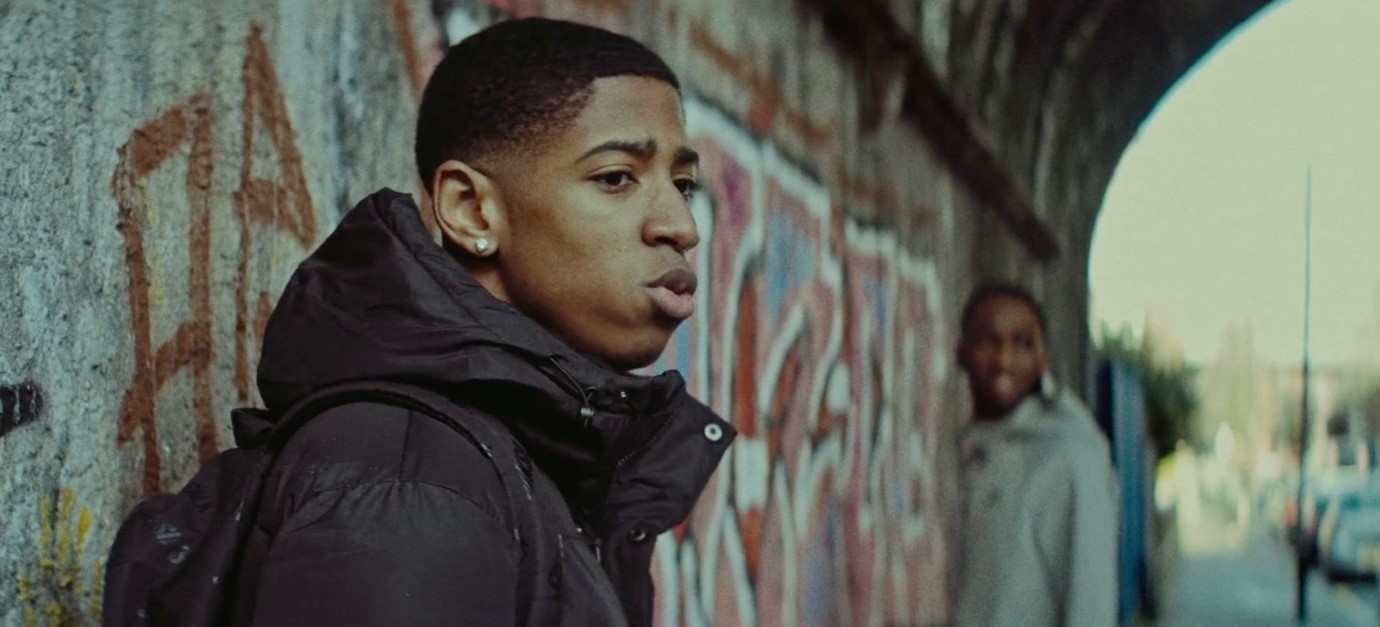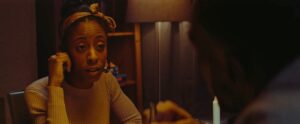
BAFTA Qualifying Short Film Review “A Letter To Black Men”
WATCH THE TRAILER HERE
First, the Recap:
Which voices are you heeding? We can all attest that life can come at you fast and hard, knocking you down or picking you up, making you have to choose between paths that could either lead you to constructive, fulfilling ends or otherwise guide you into a world of dark deeds and less-than-noble people. When that choice is presented to you, when it’s all that black and white–which one will you choose? A young man named Kevin (Jesse Lihau) has all the potential in the world–when he applies himself. Now in the wake of his father’s death, he finds himself caught up with nefarious elements involved with life in a gang. But, when a former “associate”, Black (Baba Oyejide), who’s directly tied to the past’s events resurfaces upon release from prison, Kevin’s world gets shaken again, this time having to choose between better and worse angels to determine his future, even possibly his potential fate.
Next, my Mind:
Like another of the award-qualifying efforts I reviewed earlier, “War of Colors“, but taking a decidedly alternative, equally unvarnished, intentional, and deeply evocative look at the plight and even debates surrounding the black community and gang life worldwide in a manner that shines the light of awareness and reality inwards to the struggles and dreams of those living within it, this 20-minute BAFTA qualifying short film from writer/director/producer/editor Kiosa Sukami delivers a passionate, unrestrained glimpse into both criminality and the as of yet untapped potential of one young man faced with a life-altering choice that will define who he has been, is now, and will become in contemporary London, England. This critic is very impressed by directors who are willing to address the state of being within their own realms of relatability and familiarity, NOT as a means to belittle or devalue said community, but to simply be REAL about what elements the culture faces within its own circles, doing so via fearless, unflinching, effective, affecting resolve.
Here, we are entreated to a narrative that sees a series of events involving the aforementioned young black man attempting to discover what his world will be encompassed (or potentially engulfed) by one day running into a former “friend” who wishes to see him rise above the direction he’s going and realize the more sound, level-headed, intelligent, artistic man he is and can be, in spite of the initial circumstances that have lead him there, hence forcing him to truly face those possibilities vs. the darker elements that wish to drag him along into further corruption. It’s a definitively edgy, gritty tale that does such a superb job, however, of infusing the more hopeful facets of the story into the chaos. But again, considering literally how the entire effort begins, the viewer will still have to realize that this is no fairy tale, and the actualities being addressed are most likely very realistic and grounded in truths that further illustrate the ongoing dilemmas of crime and other challenges amongst the black society.
What I do also admire about the manner in which this film is executed is that, in my opinion, the morals and lessons to be conspicuously or by conjecture gleaned from it transcend the foundational focus of the narrative and could most certain be a wake-up call to ALL of us when it comes to notions being scrutinized like the dangers and benefits of the company we keep, the pressures of class and the perceptions that can accompany that for good or ill, our willingness to acknowledge what is truly good vs. bad for us to pursue, the additional caveat of being open to listening to valid, caring voices of reason vs. the voices that try to sugar-coat malfeasance, and understanding what we are actually capable of while being guided towards it that we might grasp onto real dreams and goals. Any of this could be unpacked more throughout this film, and by the time its jarringly sobering finale comes around, it is a bittersweet feeling washing over you, at least it was for this critic. But, it’s actually a perfect way to end the proceedings given the film’s objectives.
Lihau delivers a wonderfully impassioned performance here, allowing us to feel and see the constantly shifting quandary that is displayed through his role as Kevin, a vibrant, smart, and perhaps hesitantly ambitious young man who has currently, though in his mind innocently or naturally, fallen into the wrong overall crowd after a loss that reshaped his thinking. But, when he reconnects with a former con who has a very pronounced tie to his past, Kevin still opens himself up to the encouragement and at least a little initial admonishment to get his life in order. But, whether he will actually follow the advice or still decide that a life on the edge will be more worthwhile remains to be seen, even as others continue to try and help him see the brighter path. It’s a perfectly grounded performance which, as it so often the case in character-driven cinema, makes it that much more relatable and accessible.
Oyejide likewise provides us with a completely credible and noteworthy performance through his turn as Black, a former “colleague” from Kevin’s earlier but still relatively recent life who more than had a drastic impact then and paid a price for it. Now out of prison, he chooses to come and find Kevin in order to take him under his wing and try to show him a more productive road to travel than the one he’s currently on. Almost a de facto father figure for Kevin, at least possibly what he’s trying to be, Black soon must take larger steps to see Kevin not fall into “the life” that has already claimed someone close, and Black must deal with the ramifications of his past as well, which carry a heavier weight than we realize at first. It’s both the subtlety and then fervency that Oyejide presents that makes the character of Black the dynamic presence he is, sometimes leaving us wondering whether he’s a beneficial or disruptive factor in Kevin’s life in the end. Excellently portrayed throughout by Oyejide.
Primary supporting turns arrive from Lynsey Murrell as Kevin’s sister Kelsie who strives to the best of her ability to not only pry her wayward, hurting brother away from crime, but also from Black whom she holds an even deeper, initially undisclosed hatred for beyond just “the life” he represents despite his newly minted legit attitude, Adam Wright plays Smokey, the ruthless head of the local gang Kevin is being drawn into, and Ashley Durant as Leon, Kevin’s best friend and who loves getting into trouble, but more so the kind that doesn’t necessarily lead to incarceration and whom Kevin’s loyalty remains strong. Additional appearances are made by Trinity Benjamin, Dejon Weston, Iain Gordon, Ashutosh Choubey, and Dandave Roache. So, in total, “A Letter To Black Men” should resonate with an audience well outside its primary target group in that its cautionary tale about seeing and experiencing the ripple effect our decisions can have on ourselves and others around us reverberates with impactful lessons we can relate to, learn from, and ideally find the means to grow from in a positive way even while recognizing that, good or bad, the outcome is reflected by who and what we are immersed in, listening to, and deciding to follow. So—what choices will you make today?
As always, this is all for your consideration and comment. Until next time, thank you for reading!





